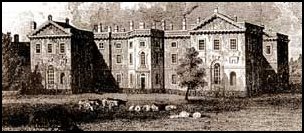Thomas Pelham served twice as Prime Minister — from 16 March 1754 to 11 November 1756 and from 29 June 1757 to 26 May 1762. He was born in London on 21 July 1693, the elder of two sons and eighth of eleven children born to Thomas Pelham and his wife Lady Grace Holles. He was educated at Westminster School and Clare Hall Cambridge, from where he matriculated (but did not graduate) in 1710. Newcastle was the first PM to spend his entire parliamentary career in the House of Lords, having taken his seat shortly after his 21st birthday. He added the name "Holles" in 1711 as required by the will of his uncle John Holles, who left him the bulk of his estates. Newcastle owned vast estates in eleven counties which enabled him to influence elections in many constituencies. Two of his boroughs were Aldborough and Boroughbridge in Yorkshire and his country seat was Clumber Park in Nottinghamshire. Newcastle was very much in favour of the 1716 Septennial Act because triennial elections were very expensive for him. The Septennial Act specified that general elections had to take place every seven years instead of every three years as previously.

Clumber House, Nottinghamshire. The house, which was extended in the nineteenth century, was demolished in 1938.
In 1717 he married Lady Henrietta Godolphin, the daughter of the Duke of Marlborough. They had no children. His connection with the Marlboroughs brought Newcastle added prestige and influence; he became a Privy Counsellor in 1717 and the same year stood as Godfather to Prince George William, son of the Prince of Wales. In 1718 he was created a Knight of the Garter; the following year, he was one of the thirteen Lords Justice to whom the king left power when he returned to Hanover. Newcastle continued to be influential in government throughout the reign of George I.
In August 1743, Newcastle's brother, Henry Pelham, became PM. The two brothers worked closely together during ministry which ended with the sudden death of Pelham. Newcastle was appointed PM in his brother's place, just as Anglo-French relations in north America were about to erupt into war. In 1756 the Seven Years' War began: this conflict involved fighting in Europe, India and north America. Newcastle unsuccessfully attempted to persuade William Pitt (the Elder) to join his ministry and — having failed — tendered his resignation. Devonshire formed a short ministry but Newcastle returned to power in 1757 with Pitt as Secretary of State for the Southern Department.

Nottingham Castle: home of the Dukes of Newcastle.
Pitt took over responsibility for the war which ended in 1763. However, George II died in 1760 and was replaced by his grandson, George III. The new king did not trust Newcastle and attempted to limit the duke's political influence by preventing him from using public money to influence voters in the forthcoming general election. Newcastle used his own money, unaware that the Earl of Bute was using royal patronage to strengthen his own support. Despite the king's efforts, Newcastle and his followers won a substantial majority. The king continued to manipulate the appointment of the Earl of Bute to more important positions in the Cabinet until Newcastle decided that he could no longer continue in office. On Newcastle's resignation in 1762, Bute became PM.
In October 1762, the Duke of Devonshire was dismissed from his post as Lord Chamberlain because the king believed that he was acting under Newcastle's influence. Newcastle was outraged and pressed his supporters to resign in protest. Some of them did so, therefore Bute retaliated by dismissing all those who owed allegiance and their positions to the Duke of Newcastle. This incident became known as the "Massacre of the Pelhamite Innocents", a reference to the Biblical story of Herod ordering the murder of all male children after the birth of Jesus, in order to maintain his own power.
Newcastle found himself increasingly isolated. In March 1764, his close friend Lord Harwicke died; this blow was compounded by the death of the Duke of Devonshire in October. Added to this, Newcastle's political protégé, the young Marquis of Rockingham, was becoming more independent. Rockingham formed his own ministry in July 1765, appointing Newcastle as Lord Privy Seal. Newcastle's hopes that he would continue to be consulted as an "elder statesman" were dashed when the marquis formulated his own policies.
Although continuing to sit in the House of Lords and take an active part in the political life of the country, Newcastle was becoming increasingly frail. In December 1767 he decided to go to Bath to take the waters, since he was suffering from a persistent cold and cough. He possibly suffered a stroke whilst in Bath. He returned to his home at Claremont in Surrey, but his condition worsened. Newcastle died on 17 November 1768 at the age of 75.
Recommended reading
Browning, R. The Duke of Newcastle. New Haven, 1975.
Kelch, R.A. Newcastle: A Duke without Money. London, 1974.
Last modified 6 March 2012